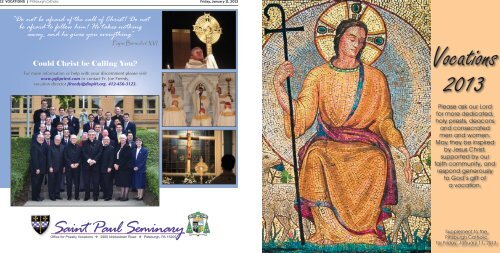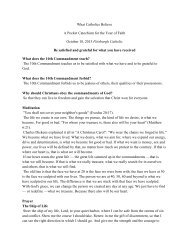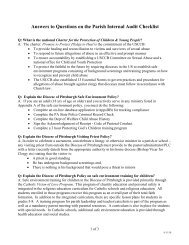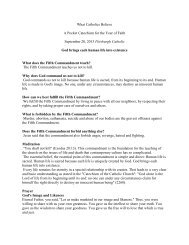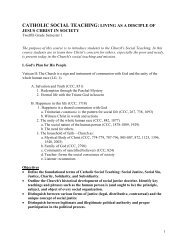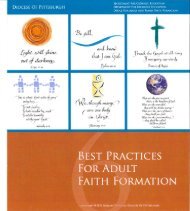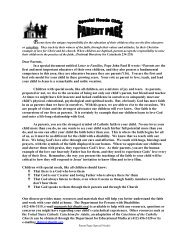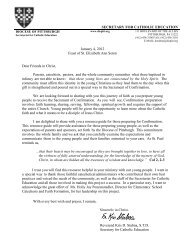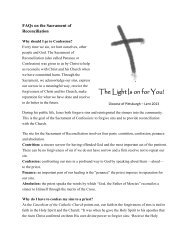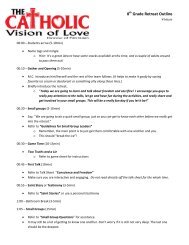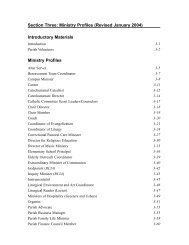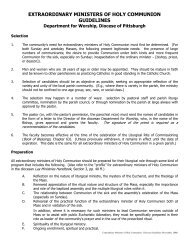Vocations 1.11.13.pdf - Diocese of Pittsburgh
Vocations 1.11.13.pdf - Diocese of Pittsburgh
Vocations 1.11.13.pdf - Diocese of Pittsburgh
- No tags were found...
Create successful ePaper yourself
Turn your PDF publications into a flip-book with our unique Google optimized e-Paper software.
12 ocation_ad_ <strong>Vocations</strong> 2013_Layout | <strong>Pittsburgh</strong> 1 1/3/2013 Catholic 2:24 PM Page 1Friday, January 11, 2013“Do not be afraid <strong>of</strong> the call <strong>of</strong> Christ! Do notbe afraid to follow him! He takes nothingaway, and he gives you everything.”Pope Benedict XVICould Christ be Calling You?For more information or help with your discernment please visitwww.pghpriest.com or contact Fr. Joe Freedy,vocation director jfreedy@diopitt.org, 412-456-3123.<strong>Vocations</strong>2013Please ask our Lordfor more dedicated,holy priests, deaconsand consecratedmen and women.May they be inspiredby Jesus Christ,supported by ourfaith community, andrespond generouslyto God’s gift <strong>of</strong>a vocation.Saint Paul SeminaryOffice for Priestly <strong>Vocations</strong> 2900 Noblestown Road <strong>Pittsburgh</strong>, PA 15205Supplement to the<strong>Pittsburgh</strong> Catholicfor Friday, January 11, 2013
10 vocations | <strong>Pittsburgh</strong> Catholic Friday, January 11, 2013Friday, January 11, 2013 <strong>Pittsburgh</strong> Catholic | vocations 3African nun studying at Duquesne lives her life spreading GospelBy PHIL TAYLORAssociate Editor<strong>Pittsburgh</strong> geographically is a long distancefrom the Serengeti, Mara, region <strong>of</strong>the East African country <strong>of</strong> Tanzania, butfor Immaculate Heart Sister <strong>of</strong> Africa AgnesAfricanus for the last five months it hasbeen home.She says her community has a specialcharism, particularly in relation to the Africanpeople.“The Immaculate Heart Sisters <strong>of</strong> Africahave consecrated themselves in a specialway to the Immaculate Heart <strong>of</strong> Mary byfollowing her example,” she said. “Hence,we live the family life like the Holy Family<strong>of</strong> Nazareth that starts and grows in oursmall family communities in which we live,and extend the same family and Christ’slove to embrace all people that we serve.“We foster the conversion <strong>of</strong> each member’scommunity and the conversion <strong>of</strong> thepeople <strong>of</strong> the continent Africa, as a missionarycommunity striving to be witnesses<strong>of</strong> Christ by our life.”Sister Agnes currently is enrolled in thegraduate School <strong>of</strong> Education at DuquesneUniversity pursuing a doctorate in educationalleadership. She has been in theUnited States for six years and previouslyearned bachelor’s and master’s degreesin accounting and international businessfrom D’Youville College in Buffalo, N.Y.Sister is from a family <strong>of</strong> nine, and isthe second born and the first among girlsin her family. Both <strong>of</strong> her parents still areliving, and she also has a younger brotherwho is a priest.“First <strong>of</strong> all, I was born and grew upin a very devoted Catholic family,” shesaid. “Both <strong>of</strong> my parents and grandparentswere good, practicing Catholics. Mydad volunteered to teach catechumensto people who wanted to be initiated intothe Catholic Church. I learned prayersPhoto by Chuck AustinSister Agnes Africanus, originally from Tanzania, is working on adoctorate degree at Duquesne University.and catechism for children by heart frommy brother before I started my primaryschool.”And although her family had close ties tothe church, she said it was not easy initiallyto ask her father for permission to join religiouslife. She was overjoyed with his responseeven though it was contrary to theirethnic culture and tradition where girls arenot given the freedom to chose what theySISTERS OF THEDIVINE REDEEMER100 Years in AmericaCame to McKeesport from HungaryCelebrate with Us . . .Share a Memory . . .srjoannetsdr@comcast.net412-751-8600want to do in life. In making the decision,she said he had to endure hardship, criticismand even isolation from some familymembers.“People stopped mocking my parentswhen my younger brother decided to goto the seminary and later became a priest,”she said. “Those who objected us sostrongly are the ones who are encouragingus now so strongly.”She still has strong feeling about howgirls in her native country were denied certainfreedoms when she was growing up.“In my home village, I saw many girlswho completed primary schools before me,and many <strong>of</strong> them were forced to marriageat a very young age — not <strong>of</strong> their own will,”she said. “Some <strong>of</strong> them underwent severepunishment because they denied marriagein order to seek education. I wanted to joinreligious life to devote my life to the servemany marginalized children mostly girlswho’s voices were not heard.“I knew that it is education that couldchange the institution system. I felt to bethe luckiest girl from my ethnic tribe tohave freedom, the freedom that many girlsin Mara region do not have until now. I realizedthat I had freedom because my dadhad a high school education, although hedropped out <strong>of</strong> school before his graduation.”Although she currently is not involvedlocally in any ministry because <strong>of</strong> her doctoralstudies and is in the country on a studentvisa, she recalled fondly her formerministries abroad.“After my first pr<strong>of</strong>ession, I was assignedto work in one <strong>of</strong> Tanzania’s dioceses,Shinyanga,” she said. “I worked inthe parish called Mwamapalala doing differentwork, teaching religious education.”She said during that time she learnedKisukuma, the local language in the area.Traveling by bicycle she said, “I wentover five kilometers to the neighboringschools to provide religious education tostudents. In the evening, I visited smallChristian communities prayed with communities,and I had domestic classes withwomen. I worked in Shinyanga for threeyears.”In 1989, Sister Agnes said her communitygave her the opportunity for a secondaryeducation, and following graduation shewas assigned to the newly formed Geita<strong>Diocese</strong>.“The new diocese had a lot <strong>of</strong> constructionactivities, so the bishop asked my superiorgeneral to assign one sister to be thein charge <strong>of</strong> procurement, store keepingand nursery trees project,” she explained.In 1993/1994, her community in collaborationwith the bishop, provided her theopportunity for a one-year course in accountingand materials management at St.Augustine University <strong>of</strong> Tanzania.“After graduation, I had my perpetualvows in 1994,” she said. “My superior generalwanted me to go back to St. Augustinefor three years study in accounting, but thebishop wanted me to work for two yearsbefore I went back to college. I went back toGeita <strong>Diocese</strong>. I worked for two years, andafter our general chapter in 1996, instead <strong>of</strong>going to college, I had a new assignment asthe treasurer general for my home <strong>Diocese</strong>,Musoma.“I travelled to different locations <strong>of</strong> thediocese and out <strong>of</strong> the diocese for workissues. I was responsible for all diocesanfinancial activities, projects, to financialbooks and information, reports, diocesanassets, and a secretary for diocesan subcommittees.”She said that following nearly 10 years<strong>of</strong> hard work in the Musoma <strong>Diocese</strong>, hercommunity had a scholarship from D’Youville College for two sisters for under-See Sr. Agnes, Page 11Mercy sister has foundfulfillment in ministryin service to othersShe has headed the<strong>Pittsburgh</strong> Mercy HealthSystem for five yearsBy PATRICIA BARTOSCorrespondentWhen talking about her vocation to religiouslife, Sister Susan Welsh points to thefourth vow taken by all Mercy sisters — that<strong>of</strong> service.“In addition to the vows <strong>of</strong> poverty, chastityand obedience, we have the vow <strong>of</strong> service,”she said <strong>of</strong> the idea that encompassesher 48-plus years in the order and explainswhy she has loved every ministry she filledduring those decades.“I’ve always seen ‘service’ as importantthrough all <strong>of</strong> life,” she said. “It’s a very, veryhumbling experience, it’s certainly been forme in ministry.”Sister Susan has headed the <strong>Pittsburgh</strong>Mercy Health System for five years, overseeingthe region’s largest health and socialservice non-pr<strong>of</strong>it organization.Earlier she had served as treasurer andchief financial <strong>of</strong>ficer for the Mercy orderfor 30 years and as vice president <strong>of</strong> the• Have public recitation <strong>of</strong> the diocesanvocation prayer at Masses on Sunday andthe daily Masses.• Provide eucharistic adoration on certaindays, asking for prayers for vocations.• Send greeting cards to each <strong>of</strong> the seminarians<strong>of</strong> your diocese at the beginning<strong>of</strong> a new semester, holidays, exam times,birthdays, ordinations, etc.• Sponsor poster/coloring/essay contestswith vocation related themes and exhibitthe results.• Encourage interviews <strong>of</strong> pastors,priests, sisters, brothers and deacons forthe school newspaper or parish bulletin,especially on how they discerned their call.• Create a page on your parish/schoolweb site with vocation information.• Host an Altar Server AppreciationNight and ask one <strong>of</strong> the priests to speak tocommunity for eight years.The native <strong>of</strong> St. Elizabeth in PleasantHills entered after high school and completedstudies at Carlow University andearned a master’s degree in education fromDuquesne University, before teaching at St.Peter School on <strong>Pittsburgh</strong>’s North Side andat Our Lady <strong>of</strong> Mercy Academy in Monroeville.“The sisters place great value on educationand I loved teaching,” she said. Shedescribed herself as “quite desolate” whenshe learned the academy was closing — andsurprised to learn her new assignment wasas treasurer for the order.This led her to Robert Morris University,where she earned a master’s in business administrationto ground her in her new role.“I loved the idea that in religious communitywhere you have a vow <strong>of</strong> povertyand share everything in common, it’s niceto have someone in charge <strong>of</strong> finances, inservice to the sisters. That part appealed tome.”In 2007, the Mercy leadership consolidated25 communities <strong>of</strong> sisters in <strong>Pittsburgh</strong>,Erie, Buffalo, Rochester and the Philippinesto form the Sisters <strong>of</strong> Mercy <strong>of</strong> the Americas.Sister Susan’s position was eliminatedand she had no immediate plans other thanthe servers.• Before a regular meeting, have yourministry or group get together a little earlierto say a decade <strong>of</strong> the rosary together for aspecific priest or seminarian.• Create a collage <strong>of</strong> photos <strong>of</strong> priests,brothers and sisters who have been part <strong>of</strong>your community.• Include <strong>Vocations</strong> Awareness lessonplans and programs at each grade level <strong>of</strong>religious education. Each grade can do aspecial project and the reports can be combinedinto a resource booklet.• Have the vocation prayer printed on refrigeratormagnets and distribute.• Find out the ordination date <strong>of</strong> yourparish priests and celebrate within the parishand school.• Promote the lives <strong>of</strong> saints in variousways, e.g. in the bulletin, on the bulletinPhoto by Don Scandinaro Photography for<strong>Pittsburgh</strong> Mercy Health SystemMercy Sister Susan Welshto begin cleaning out her papers after decadesas treasurer.At the same time, the Mercy sisters soldMercy Hospital to UPMC. While the hospitalitself was sold, “we were still goingto have all these other ministries affiliatedwith Mercy that were going to continue,”she said.In yet another surprise appointment, SisterSusan was named to oversee those ministries,gathered under the title <strong>of</strong> <strong>Pittsburgh</strong>Mercy Health System.board, on posters, in a bibliography, etc.• Take a group from your parish or schoolIs God calling?Perhaps we’re the answer…transforming the heart through classical monasc life.“After I picked myself up from the floor, Ibegan doing what needed to be done,” shesaid. “I’ve been fortunate to work with wonderful,wonderful people who have helpedme, people who have been part <strong>of</strong> the MercyHealth System for many years. It’s a verywell-respected entity in the area,” she said<strong>of</strong> the health system.Part <strong>of</strong> her work involves “telling our story”and trying to overcome confusion aboutthe new system -- which does not includeMercy Hospital.<strong>Pittsburgh</strong> Mercy Health System includes1,700 employees staffing health andsocial service programs which reach morethan 26,000 people each year.The system includes A Child’s Place atMercy, McAuley Ministries, Mercy BehavioralHealth, Mercy Community Health,Mercy Intellectual Disabilities Services,Mercy Parish Nurse and Health MinistryProgram, Operation Safety Net, <strong>Pittsburgh</strong>Mercy Health System Development and<strong>Pittsburgh</strong> Mercy Family Health Center.Services are provided to 26,000 people annuallyin more than 60 locations in AlleghenyCounty.Sister Susan entered religious life at avery young age, and recalls, “I look backon how highly I valued that concept <strong>of</strong> a‘call’ to follow God. I saw it as a call, but inthe very beginning I thought that maybe insix months or so God would say, ‘This is notright for you, get on with your life.’”That message never came and “over theyears it just became truly a very special lifethat I grew comfortable with,” she said.“After 48-plus years I see how my life hasevolved. I have loved every single thingI did. I loved teaching kids, I loved beingin financial ministry and I love the job Ihave now.”Ways to promote vocations in your parish or schoolto attend the ordination <strong>of</strong> a diocesan priestSee Promote, Page 5Benedicne Nuns <strong>of</strong> St. Emma Monastery1001 Harvey Avenue, Greensburg, PA 15601www.stemma.org + 7248343060
4 vocations | <strong>Pittsburgh</strong> Catholic Friday, January 11, 2013Priest happy learning the daily duties <strong>of</strong> parish lifeBy Chuck MoodyAssociate EditorFather Chris Donley first thoughtabout becoming a priest in eighth grade.“While I knew that God was calling meto a life <strong>of</strong> service in a particular way, Iwas not quite sure in what way that wasat that time,” said Father Donley, a parochialvicar at St. Sebastian Parish inRoss Township. “As I went through highschool and college, I continued to lookfor ways that God might have been callingme to live my vocation. I have to admitthat for a long while, I thought Godwas calling me to the married life.”Father Donley worked at CatholicCharities in Downtown <strong>Pittsburgh</strong> fora few years after college, “All the whilecontinuing to try and find God’s plan forme.”“I thank God eachday for giving me thisamazing vocation tothe priesthood <strong>of</strong> JesusChrist.”“And even though I did not always stayas close to the sacraments as I shouldhave, and did not always make the rightdecisions in my life, God continued tobless me with opportunities to discovermy vocation to the priesthood,” he said.“While the full story is obviously muchmore detailed, one day I was given theamazing grace <strong>of</strong> realizing that Godmight be calling me, in a real way, to thepriesthood. So, I stopped seeing this girlI was dating, and started talking with thePhoto by Chuck AustinFather Donley is currently serving as a parochial vicar at St. SebastianParish in Ross Township.church more, trying to discover whetheror not God was calling me to the priesthood.”After about a year <strong>of</strong> discernment, andups and downs, trying to find God’s planfor him, Father Donley entered St. PaulSeminary in Crafton....an international Congregationin a multicultural worldImpelled by the love <strong>of</strong> Christ,the Sisters <strong>of</strong> Charity <strong>of</strong> Nazarethwork for justice, work with the oppressed,especially the poor and women,and believe in caring for the earth.To learn more about our beliefs and our ministries, visitscnfamily.org or contact Vocation Director Nancy Gerth, SCN,502.331.4516 or snancy@scnazarethky.org.“It was in the seminary that I was ableto truly discern God’s call for me, andat the same time the church was able todiscern whether or not she thought I wascalled as well,” he said. “In the end, Godcontinued to lead me along the pathwayto the priesthood, and, praise God, I wasordained in July 2011.”Father Donley’s job at Catholic Charitiesinitially was a caseworker for the informationand referral department, andhe later become the coordinator for thedepartment. He majored in history andminored in theology while in college.“I was planning on working at CatholicCharities, finding a wife and raising afamily here in <strong>Pittsburgh</strong> before I heardthe call to the priesthood,” Father Donleysaid.Many priests helped to influence hisdecision to enter the seminary, he said.“I was blessed growing up to be surroundedwith a few really solid, faithfulpriests in my life, and as I grew older, Igot to know quite a few amazing priests,”Father Donley said. “We are blessedin the <strong>Diocese</strong> <strong>of</strong> <strong>Pittsburgh</strong> to have somany wonderful priests who have heardand answered the call to lay down theirlives for the people <strong>of</strong> this diocese. I wasalso fortunate enough to have a cousingoing through the seminary while I washaving the same thoughts.”Father Donley’s family also was a hugeinfluence on his decision to enter theseminary.“From my grandparents to my parents,to my siblings, aunts, uncles andcousins, I was, and am, blessed to havesuch a wonderful, faithful family whohas supported and helped foster my vocation,and many others,” he said.After he was ordained, Father Donleyserved as parochial vicar, pro-tem, atSt. Charles Lwanga in <strong>Pittsburgh</strong>’s EastEnd. After a few months, he returnedto Rome to finish his studies at the PontificalNorth American College. Uponreturning to the diocese, Father Donelywas assigned to St. Sebastian.“While there are many aspects <strong>of</strong> thepriesthood that I could discuss in terms<strong>of</strong> being the most rewarding, I wouldhave to say that the celebration <strong>of</strong> the Eucharistwould be on the top <strong>of</strong> the list,”he said. “Being able to <strong>of</strong>fer Mass dailyfor the parishioners, standing in theplace <strong>of</strong> Christ at the altar <strong>of</strong> sacrifice,is something that is very difficult to putinto words. God is good, and the priesthood,in its sacrifices, joys, sufferingsand miracles, is a life that I would nottrade for anything. I thank God each dayfor giving me this amazing vocation tothe priesthood <strong>of</strong> Jesus Christ.“I am also having a wonderful experiencein the parish life, coaching our CYMbasketball team, <strong>of</strong>fering spiritual directionfor parishioners, living amongstother priests, and learning the day in, dayout duties <strong>of</strong> the parish priest. I couldn’tbe happier that God has called me to thepriesthood here in <strong>Pittsburgh</strong>, and that Iwas given the continual graces possibleto hear and answer that call.”What advice does Father Donley havefor a man who is considering the priesthood?“Pray, talk to your family, talk to apriest, talk to some close friends,” hesaid. “Above all, talk to God, and do notbe afraid to <strong>of</strong>fer your life to God in whateverway he might be asking you to. Godis good and will lead you, if you stop, listento him, and trust in him, to love andhappiness, your true vocation in life. Donot be afraid to sacrifice for others, thereis no greater reward.”Friday, January 11, 2013 <strong>Pittsburgh</strong> Catholic | vocations 9The seedbed <strong>of</strong> my vocation: One sister’s storyBy SISTER MARY JOANNARUHLANDA family takes time to pray the rosary. Never underestimate theimportance <strong>of</strong> prayer.The formation <strong>of</strong> every human personbegins in a family, whatever its conditionmay be — healthy, religious, irreligious,broken or divorced. Held in the tenderloving care <strong>of</strong> our God, the family prepares,according to its state and condition,every child to know, love and serveGod. Every family provides childrenwith the place for natural maturation —physically, psychologically, spiritually —to receive and respond to a call from Godto a vocation to the priesthood or consecratedlife.Allow me to share with you ways thatmy family became the “seedbed” for myvocation as a religious sister:Marital love becomes familial and filiallove. The love my father and mother hadfor each other, and for God, told me volumesabout God’s love. It is faith in Godthat brought my parents through maritaldifficulties, deaths in the family, and othertrials and joys <strong>of</strong> life. Through prayer,their relationship with God nourishedqualities <strong>of</strong> healthy, holy relationships:courage in speaking the truth in love, patiencein weaknesses, forgiveness afterhurtful words and pardon sought.Our familial relationship with Godwas nourished (communally and individually)through the sacraments. Thefamily is where I learned the love <strong>of</strong> God“made flesh” in our family, and this lovenourished my own love for God and thelove I have for the sisters in my religiouscommunity. In fact, as a religious sister,my love for God is expressed as being likethat <strong>of</strong> spousal love, eventually sealed inmy consecration to him as a religious sisterand pr<strong>of</strong>ession <strong>of</strong> the vows <strong>of</strong> poverty,chastity and obedience.Hindsight is 20/20! Although I did notalways understand the importance <strong>of</strong>prayer in our family, I sensed it. Kneelingafter supper around the dinner table topray the rosary during Lent, going to theStations <strong>of</strong> the Cross and the sacrament<strong>of</strong> penance, and Sunday Mass — despitemy young “groans” at the discipline to doso — opened my heart to my own personalrelationship with the Lord. As a youngadult in college, I realized the importance<strong>of</strong> prayer and began to take responsibilityfor my own relationship with Godthrough prayer.Eating our meals together as a familytaught me the importance <strong>of</strong> being together,sharing the day’s blessings andchallenges. I remember the struggle weshared when the telephone began ringingmore frequently during supper. Itinterrupted our conversation and <strong>of</strong>tenseemed necessary to answer. We realizedthat many phone calls were not necessaryto answer immediately. Valuing ourtime together, we decided to turn <strong>of</strong>f theringer during supper. I grew in respectfor my parents’ wisdom and their vigilanceover our family time together. Today,my religious community’s highestvalue is the Holy Sacrifice <strong>of</strong> the Mass,and we, too, must be vigilant in protectingit from interruption. The Mass is the“source and summit” <strong>of</strong> our life togetherand in service to others.Every Sunday after Mass, our familywould visit my widowed paternal grandmother.Visiting her taught me the value<strong>of</strong> respect for authority, and this becamethe ground out <strong>of</strong> which I learned lovefor the superiors <strong>of</strong> our religious community.I understood more readily fromthis example <strong>of</strong> benevolence towardsthe sick and dying the representation <strong>of</strong>God’s love that authority ideally holds.Knowing the responsibility they bear, Iwas more quick to pray for them. Whenpersons in authority have no regard, respector love for God, their authority becomesexercising power for the sake <strong>of</strong>controlling others to achieve their ownends. True authority is service for others.The compassion that our familyshowed to the poor, sick, and sufferingin our community taught me how to lovemy neighbor with generosity and tenderness.Children seem to have an innateability to give, and help those in need. CNS photoWhen nurtured, this desire becomes afruitful form <strong>of</strong> self-gift to God. The joy <strong>of</strong> helping those in need is recalled at momentswhen the self-gift requires a deepersacrifice. This is critical to understandand develop to maturity for any vocation.In fact, even after we have responded toa particular vocation <strong>of</strong> marriage, priesthoodor consecrated life, maturation inself-donation to God, and others for thesake <strong>of</strong> the kingdom, continues! Daily, inmy work and prayer, God gives me opportunitiesto deepen my love for himand for my neighbor.These are just a few simple ways I recognizehow my parents and family contributedto my religious vocation, and Icould not be more grateful for their patienceand love. May the Holy Family <strong>of</strong>Jesus, Mary and Joseph, guide all familiesand parents to respond to God’s willwith generous and willing hearts for love<strong>of</strong> him!Mercy Sister Mary Joanna isassociate director, Secretariat <strong>of</strong>Clergy, Consecrated Life and <strong>Vocations</strong>,for the U.S. Conference <strong>of</strong>Catholic Bishops.
8 vocations | <strong>Pittsburgh</strong> Catholic Friday, January 11, 2013Ceremony welcomes new Franciscan AssociatesBy NICK RODIThe Associates <strong>of</strong> the Sisters <strong>of</strong> St.Francis <strong>of</strong> the Providence <strong>of</strong> God heldtheir annual Commitment during a liturgyon Oct. 14, during which time theywelcomed new member, Michaele Fisher.The commitment was preceded by a retreatled by Sister Nancy Langhart. Thoseassociates unable to attend made theirCommitment privately.A retired school teacher who taughtin the <strong>Pittsburgh</strong> Public Schools for 35years, Michaele attended St. Regis Elementary,St. Paul Cathedral High Schooland Carlow College. She also obtainedher masters in education and reading/language arts from the University <strong>of</strong><strong>Pittsburgh</strong>.An avid sports fan, she also enjoystravel. Michaele tells us that she is gladto have found a place for herself with thesisters and honored to become an associate.“I am very happy to have found theSisters <strong>of</strong> St. Francis <strong>of</strong> the Providence <strong>of</strong>God and all the wonderful friends I havemade at the convent.”Called to be H olyContact: Fr. Joe Freedy • Director <strong>of</strong> <strong>Vocations</strong>412-456-3000 x 3612 • jfreedy@diopitt.orgPhotos by Sister Althea Anne SpencerAssociates for 2012 pose for a photo in Mary Immaculate Chapel after the commitment ceremony. From leftare Sister Joanne Brazinski, general minister, Jan Chehovin, Michelle Sinclair, Mary Ann Garfold, MichaeleFisher, Rosemary Byrd, Kathy Antoniazzi, Chris Lapinski, Carol Stasik, Mary Ann Julkowski, Kathy Butler,Johannah Jones, Lori Vallarian, Pat Enscoe, Sister Barbara Zilch, Audrey Patterson and Father Frederick Cain,chaplain.Saint Vincent Seminary300 Fraser Purchase RoadLatrobe, PA 15650-2690724-532-6600http://www.saintvincentseminary.eduWho are the associates?Lay association with religious congregationshas spread like wildfire worldwideduring the past 35 years, but theconcept is not new. Recognizing theneeds <strong>of</strong> the 13th century, St. Francis begana lay movement to bring the Gospelto the people. These lay people could bethought <strong>of</strong> as the first Franciscan Associates.Today’s lay persons continue to becalled to share the Gospel with a worldin need <strong>of</strong> healing and peace. Associateshaving a vision and desire to embrace thevalues <strong>of</strong> Francis can do so while maintainingtheir individual lifestyles.Associates are ceremonially receivedand express a non-vowed commitment.Their names are on record. They receiveregular mailings and participate in congregationalevents. Thus, they have theopportunity to share actively and intentionallyin the mission and charism <strong>of</strong> thecongregation and thereby deepen theirown spiritual lives. The congregationalso benefits by extending its missionand charism to a wider arena than mightbe possible if limited to the ministry andpresence <strong>of</strong> its own vowed members.Being an associate means participatingin the formative experiences <strong>of</strong> the Franciscancongregation. Members sharetheir gifts through work, prayer and socialexperiences with the sisters as well asother associates. Members choose to beSister Barbara Zilch, associatedirector, welcomes MichaeleFisher to the Associate Program<strong>of</strong> the Sisters <strong>of</strong> St. Francis <strong>of</strong> theProvidence <strong>of</strong> God.involved through prayer, shared spirituality,volunteering, ministry, communitylife and any number <strong>of</strong> other activities.If you feel called to support and be supportedin prayer, to be a part <strong>of</strong> a faithsharing group, perhaps you are beingcalled to be an associate <strong>of</strong> the congregation.If you are interested in becoming anassociate, or in learning more about associates,please call Sister Barbara Zilch at412-885-7402.This article originally appeared in the Sisters<strong>of</strong> St. Francis <strong>of</strong> the Providence <strong>of</strong> God’sWhitehall Franciscan newsletter (Vol. 21,No. 4.).Friday, January 11, 2013 <strong>Pittsburgh</strong> Catholic | vocations 5Community engages lay woman in vocation ministryIn early 2010, the Sisters <strong>of</strong> DivineProvidence decided to try a new way toreach young women who might be interestedin religious life. They decidedto enter the world <strong>of</strong> social media. Theposition <strong>of</strong> vocation/social media outreachwas created and the search beganfor candidates with a passion for newmedia who were pr<strong>of</strong>icient with thetools and techniques <strong>of</strong> social media. Avery important aspect <strong>of</strong> the candidate’spr<strong>of</strong>ile would be their knowledge <strong>of</strong>the Catholic Church and, in particular,vowed religious life.They were fortunate to find the perfectcombination in Rose Beauclair Radkowski.A native <strong>of</strong> Fargo, N.D., she is“Rose has broughtso much to thevocation <strong>of</strong>fice. Notonly her faith andunderstanding <strong>of</strong>vowed life, but herenthusiasm andknowledge in the area<strong>of</strong> social media hashelped us bridge thegap between those<strong>of</strong> us in a differentgeneration and thewomen who areseeking us.”— Sister Lisa PaffrathDivine Providence Sister Lisa Paffrath, left, and Rose Radkowski at thecomputer.a graduate <strong>of</strong> the University <strong>of</strong> NotreDame with a bachelor’s degree in liberalarts and a master’s degree in theology.She also holds a master <strong>of</strong> libraryand information science degree fromthe University <strong>of</strong> <strong>Pittsburgh</strong>. Her priorwork experience includes serving as thedirector <strong>of</strong> marketing and communicationsat St. John’s School <strong>of</strong> Theology/Seminary in Collegeville, Minn.Rose began working with Sister LisaPaffrath, vocation coordinator for thecommunity, to develop a strategic planfor both vocation efforts and social mediaoutreach. She steeped herself in thehistory <strong>of</strong> the Sisters <strong>of</strong> Divine Providence,reading everything availableMeet our sisters atwww.sosf.org and discovertheir diverse everyday lives<strong>of</strong> prayer, communityand ministry.VOCATION MINISTERSister Joselle Orlando315.634.7083, jorlando@sosf.orgabout the founding <strong>of</strong> the congregation.Rose is involved in many <strong>of</strong> the administrativetasks <strong>of</strong> the vocation <strong>of</strong>fice, coordinatingpresentations and meetings,ordering various items to be given awayat vocation fairs, recruiting sisters towitness or give vocation talks. Accordingto Sister Lisa, “Rose has brought somuch to the vocation <strong>of</strong>fice. Not only herfaith and understanding <strong>of</strong> vowed life,but her enthusiasm and knowledge inthe area <strong>of</strong> social media has helped usbridge the gap between those <strong>of</strong> us ina different generation and the womenwho are seeking us.”With Sister Lisa, Rose participatesin the <strong>Pittsburgh</strong> Religious VocationCouncil (PRVC), attending meetingsand working on collaborative projects.According to Sister Althea Spencer, aSister <strong>of</strong> St. Francis <strong>of</strong> the ProvidencepromoteContinued from Page 3or deacon. Check out the vocations calendarfor dates <strong>of</strong> upcoming ordinations.• Invite a priest, sister or deacon to supperto discuss vocations around the familydinner table.• Sponsor a Communion Breakfast witha vocation speaker.• Invite the director <strong>of</strong> vocations to the<strong>of</strong> God, who is also treasurer for thegroup, “Working with Rose has beenan absolute delight. She brings a loveand understanding <strong>of</strong> religious life toall our functions. Her gracious sharing<strong>of</strong> technological usage in marketing <strong>of</strong>religious life is a continued enlightenmentand encouragement to the members<strong>of</strong> the PRVC. Rose’s involvement invocation ministry for religious life as alay woman in the church is a new, butgrowing trend.”Rose is responsible for employing socialmedia to raise awareness <strong>of</strong> the mission<strong>of</strong> the community and to encourageaudiences to use social media as a way toconnect with the sisters. She took overthe administration <strong>of</strong> the communityFacebook page, increasing the “Likes”by 48 percent in the past 16 months.“I’m pleased that the page has gottennew Likes,” says Rose. “And it’s evenbetter to see more engagement with ourposts. People like pictures <strong>of</strong> events andcelebrations, but they really respond torequests for prayers.” According to JeanDennison, executive director <strong>of</strong> the <strong>of</strong>fice<strong>of</strong> mission advancement, “I don’tknow what I would do without Rose.She immediately knew what to do withour sadly neglected Facebook page. Sheposts daily and her posts are timely, interesting,and <strong>of</strong>ten pose questions thatengage our Facebook community. Weare pleased with the increase in trafficto the page.”While sisters and associates continueto pray for vocations and to refer womenwho have expressed an interest inreligious life, social media is becominganother way to introduce the mission<strong>of</strong> the community to a broader audience.Sister Mary Francis Fletcher,provincial director, says, “It is ourhope that, with Rose’s help, thisnew outreach will enable us to connectwith energetic, committedwomen who will join us in carrying outour mission.”parish for a weekend, for Masses andmeals with parish families.• Ask 31 parishioners to volunteer topray the rosary or attend Mass on one <strong>of</strong>the 31 days <strong>of</strong> the month for vocations onbehalf <strong>of</strong> your parish and committee.• Celebrate feasts <strong>of</strong> the saints, such asattending Mass on the feast <strong>of</strong> St. Therese<strong>of</strong> Lisieux, patroness <strong>of</strong> missionaries andpatroness <strong>of</strong> many vocations.• Provide intercessory prayers for vocationsfor Prayer <strong>of</strong> the Faithful at Mass.
6 vocations | <strong>Pittsburgh</strong> Catholic Friday, January 11, 2013Deacon believes his ministry does not end at church altarFor him, the mostfulfilling role <strong>of</strong> a deaconis to be there for peoplein times <strong>of</strong> sickness,crisis and loneliness.By PAULA A. SMITHCorrespondentDeacon Michael Kelly, 57, <strong>of</strong> WilkinsTownship, considered a religious vocationto the diaconate for several years,but it wasn’t until Father Thomas Kredel,former pastor <strong>of</strong> St. Bernadette inMonroeville, spoke with him on EasterMonday in 1994, that he felt the “finger <strong>of</strong>God” touch his life.“It was a chill because I’d never spokento him about this,” the deacon said.He recalled the morning he and wife,Marty, were leaving church after a weekdayMass when Father Kredel mentionedthat a diaconate class was forming andhe had a vision that he would be a gooddeacon.“I called him my 2x4 <strong>of</strong> God right betweenthe eyes because he called my attentionto God,” Deacon Mike said.Father Kredel’s vision for him was because<strong>of</strong> how well he worked and was involvedin the parish.“He and his wife have put the Lord inthe proper perspective. They are very,very faithful and hardworking members<strong>of</strong> St. Bernadette Parish in variousactivities, especially, CCD. When we goto heaven, God is hopefully going to sayto us, ‘Well done, good and faithful servant.’I knew he would make a good deaconfrom his commitment to parish lifeand ministry,” said Father Kredel. At the time, Deacon Mike was workingand helping his wife raise their fourchildren. They also cared for her motherwho had a broken a hip and was livingwith them for three years. After a summer<strong>of</strong> prayer, discussion and discernment,he applied to become a deacon.Marty was happy and supportive withher husband’s decision.“I knew he had been called to do this.Photo by Chuck AustinDeacon Mike Kelly is described as being passionate about the diaconateministry and that it brings him great joy.We entered into it as a family.”He was ordained a deacon on June 26,1999, by then-Bishop Donald Wuerl at St.Paul Cathedral in <strong>Pittsburgh</strong>’s Oaklandneighborhood.“It was pretty overwhelming that day,”he said. “The cathedral was packed. Itwas the culmination <strong>of</strong> my formationprocess and the beginning <strong>of</strong> a new way<strong>of</strong> walking. I wasn’t sure what this wasreally going to mean.”Father Michael Decewicz rememberswhen Deacon Mike began his first assignmentat St. Bernadette when he waspastor. They served together for 10 years.“Mike is actually passionate about thediaconate ministry,” Father Decewiczsaid. “It brings him great joy. He is a goodexample in the parish for his faith, commitmentand charity. He was incrediblyhelpful to me as a pastor.”In 2003, Deacon Mike chose early retirementafter working 25 years at Verizon.The next year he was assigned toworks <strong>of</strong> charity and justice at St. Bernadette.He worked six years as chaplainat Heartland Hospice Services in Irwin,Pa., while attending St. Vincent Seminaryin Latrobe and graduated summacum laude with a master’s degree in theologyin 2007. In February, he was givena full-time position as deacon at St. Bernadette.For him, the most fulfilling role <strong>of</strong> adeacon is to be there for people in times<strong>of</strong> sickness, crisis and loneliness. Heloves the liturgy, but believes that’s notwhere a deacon stops.“If a deacon stops the acts <strong>of</strong> charityand justice at the altar, then during thedismissal when they exhort the peopleto proclaim the Gospel <strong>of</strong> the Lord thedeacon needs to be the first model <strong>of</strong> thatby ministering to the people you encounter,”he said.Father Anthony Gargotta, pastor <strong>of</strong> St.Bernadette, calls him a model <strong>of</strong> Christianlife and vocation <strong>of</strong> deacon life.“He’s the greatest model,” he said. “Heis extremely devoted to his family andhere at St. Bernadette, the largest parishin part <strong>of</strong> the Eastern diocese, the parishionerslove him.”The deacon and his family are members<strong>of</strong> St. Bernadette for 30 years.“I think that right now, God has mehere because that’s where I can do themost building <strong>of</strong> his kingdom. I loved myjob at the telephone company, but I havenever been more fulfilled or satisfied inthis job,” he said.A deacon is a member <strong>of</strong> an order<strong>of</strong> ordained ministry with its rootsin the earliest days <strong>of</strong> the church.When faced with the need for help,the apostles prayed and laid handson certain men to designate themfor special service to the community(Acts 6:1-6). The word “deacon”comes from the Greek word diakonos,meaning “servant” or “minister.”Strengthened by sacramental grace,in union with the bishop and hispriests, deacons are assigned to performa variety <strong>of</strong> liturgical functions,primarily in church, as well as works<strong>of</strong> service and charity, bringing thelove <strong>of</strong> Jesus to people in hospitals,nursing homes, jails and prisons,those in special need, or those on thefringes <strong>of</strong> society. Anywhere peopleare in need <strong>of</strong> the Gospel is wheredeacons can-and should-be found.Furthermore, deacons should be asource <strong>of</strong> inspiration, motivation,and example for all <strong>of</strong> the faithful <strong>of</strong>humble, loving service to others.Friday, January 11, 2013 <strong>Pittsburgh</strong> Catholic | vocations 7Life as a Franciscan a ‘perfect fit’ for chaplainSocial concerns, socialjustice and helping thepoor on priest’s radarBy PATRICIA BARTOSCorrespondentFather David Moczulski has had alifelong interest in politics and publicpolicy as a means to help those in need.So when he considered a vocation toreligious life, those interests led him tothe Franciscan priesthood.“I thought <strong>of</strong> Franciscan life because<strong>of</strong> St. Francis <strong>of</strong> Assisi’s focus on brotherhood,fraternity and love <strong>of</strong> nature,”said the native <strong>of</strong> <strong>Pittsburgh</strong>’s Lawrencevilleneighborhood.“I thought <strong>of</strong> Franciscanlife because <strong>of</strong> St.Francis <strong>of</strong> Assisi’sfocus on brotherhood,fraternity and love <strong>of</strong>nature,” said the native <strong>of</strong><strong>Pittsburgh</strong>’s Lawrencevilleneighborhood.He also credits the influence <strong>of</strong> theFranciscan sisters from Mount Alverniain Millvale, who taught him at St.Mary Grade School and LawrencevilleCatholic High School, and with whomhe worked at the former St. FrancisHospital during his high school and collegeyears.He thought <strong>of</strong> religious life <strong>of</strong>f andon from his early years, he said, addingthat when he did enter, “my desire wasto work for social concerns, social justiceand political involvement in helpingthe poor.”He also wanted to belong to a smallcommunity, so he joined the Franciscans’Holy Savior Province, which latermerged with the St. John the BaptistProvince, based in Cincinnati, Ohio.He was educated at Slippery RockUniversity and Washington TheologicalUnion in Washington, D.C., and ordainedin 1993 in St. Mary Church on46th Street in Lawrenceville.Father David currently serves as fulltimeinterfaith chaplain at AlleghenyGeneral Hospital on <strong>Pittsburgh</strong>’s NorthCNS photo/Emanuela De MeoFranciscans gather in a large tent outside the Basilica <strong>of</strong> St. Mary <strong>of</strong> the Angels for the International Chapter<strong>of</strong> Mats in Assisi, Italy in April 2009. Members <strong>of</strong> the branches <strong>of</strong> the order founded by St. Francis weremarking the 800th anniversary <strong>of</strong> papal approval <strong>of</strong> the Franciscan rule. There are four male communities <strong>of</strong>Franciscans in the <strong>Pittsburgh</strong> area, one <strong>of</strong> which to Father David Moczulski, a chaplain at Allegheny GeneralHospital, belongs.Side. He is also guardian, or superior, <strong>of</strong>Holy Family Friary in Avalon.But for most <strong>of</strong> his priesthood he realizedhis dream <strong>of</strong> working on justiceand peace issues.He served on the board <strong>of</strong> directors <strong>of</strong>the international Franciscan presenceat the United Nations and as executivedirector <strong>of</strong> the Franciscan <strong>of</strong>fice inWashington for Latin America, wherehe aided Franciscans working amonglandless peasants in Brazil, with victims<strong>of</strong> war in Colombia and those servingin Haiti. He also served as head <strong>of</strong> justiceand peace for Franciscans in NorthAmerica for seven years, working on issuessuch as immigration reform.“We need to be a voice to help promoteand make others aware <strong>of</strong> issuesthey otherwise wouldn’t know about,”he said <strong>of</strong> his efforts.In addition to his current chaplaincyduties, Father David continues to workon issues such as immigration and humantrafficking. “The church has alwaysbeen an important and good voiceon immigration issues,” he said.His life as a Franciscan has <strong>of</strong>feredhim the perfect fit, Father David said.“They have a strong influence throughoutthe world through their charism<strong>of</strong> supporting a preferential optionfor the poor and oppressed and forall creation.”You think youhave aVocation?Call(412) 456-3048<strong>Vocations</strong> Office


